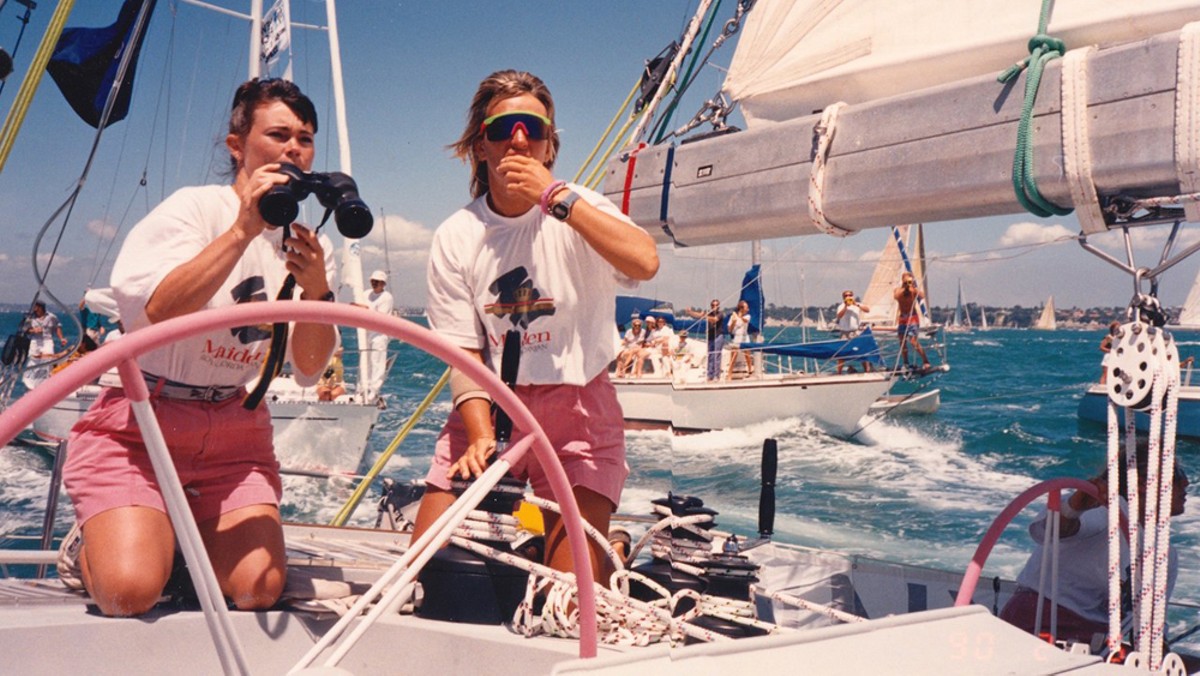For anyone who doesn't boat much, it's hard to grasp how yachting — a kind of postcard leisure activity for the hyper-rich — can be athletic, harrowing, admirable, or lethal. Maiden, Alex Holmes' new documentary focused on the 1989 Whitbread Round the World race (and so yacht racing as opposed to leisure yachting), makes a good case for the prowess, invention, and perseverance required — and shows people perishing or coming close in the process.
Tracy Edwards, the leader of the first women's team to ever compete, had all these better qualities by her mid-20s (if not a wealth of experience that might have equipped her better). From the years spent crewing and fundraising and rehabbing the titular ship — and all the way up to the day of the race itself — she's checked by her status as a woman at nearly every turn, laughed off by the male crewmen and journalists who mock her, refusing to take her seriously. For a time, Tracy — who had a rough upbringing and skews at turns apathetic and quick to anger — brushes this off, waving away any feminist appellations while keeping her nose to the task at hand. She's less interested in breaking any sort of barrier than in doing what she cares about: living out a life marked by a high degree of personal freedom. Over the movie's course, Maiden's central theme becomes Tracy's growing awareness of her place in history, the weight of her ambitions balanced against her own stature and inexperience, and the sense that so much of the world she's elbowed her way into has arrayed itself against her.
Fortunately for viewers, Maiden doesn't have to rely on re-enactments or solely on recollections to convey all this. Holmes benefits in piecing Edwards' story together from a vast trove of video footage recorded onboard the ship as it circles the globe. Capturing both tear-stained and hard-set faces, what his footage shows the racers enduring is hard to imagine. Freezing temperatures, rising waters, and two-story waves all beset the ship at times, making for a rough and often sleepless voyage whose textures can be captured with considerable struggle but could scarcely be convincingly re-created after the fact. Especially in contrast to the blandly staged (but structurally essential) studio interviews that frame Maiden's arc, this footage has a transporting quality for the unaffected shagginess of its framing, and for the sense that the crew is both hard-at-work and off-their-guard for so much of the time they're being recorded. It's a shame to think so many records of our own time will be taken by people who have effectively become their own marketing agents, questing for endorsements, business, or social media likes in glib images that are often finely calculated, everything carefully filtered and posed. Looking back today, it feels jarring to witness pieces of what feels like such a personal and unselfconscious document from 30 years back, especially of an event that would be more widely trumpeted and written up today. Likewise, it's fascinating to watch Edwards and her crew's gradually dawning awareness of their own place in sporting history (like many competitive athletes, they're not innately drawn to introspection) and what they mean to the world around them. Just as wide segments of the press, yachting fans, and other competitive racers regard Maiden's crew as a curiosity or an object of bemused scorn, it's clear that to others (and especially younger women and girls) that Edwards' crewmates were parade-floated standard-bearers and genuine inspirations: separate but twinned responses that affirm they pose a threat.
One of Maiden's inevitable tensions is the danger it runs in featuring these women so many years later, a risk of framing their story (now a period piece) as a human-interest story in a self-congratulatory or exploitative sort of way. To our good fortune, it mostly dodges this kind of superficial failing. Made up by and large of footage the women featured recorded themselves in their moment and in isolation, it lets its cast speak in a manner that, though mediated by editing, is largely for themselves. Though they're neither grandiose nor publicity-minded, they seem heartily determined, honest in their reminiscences, and comfortably themselves. For all of them, it's nothing new.
Stay on top of Detroit news and views. Sign up for our weekly issue newsletter delivered each Wednesday.






